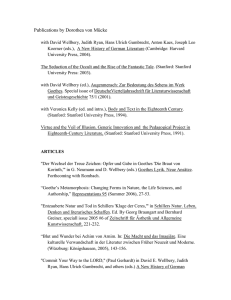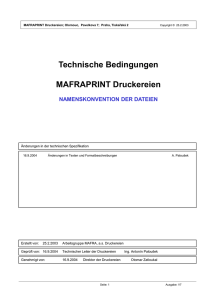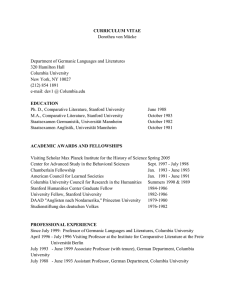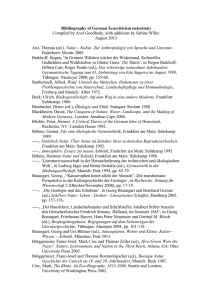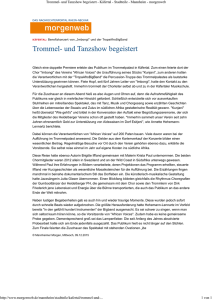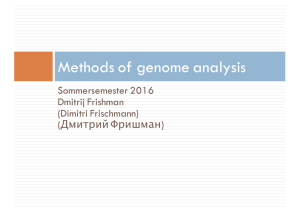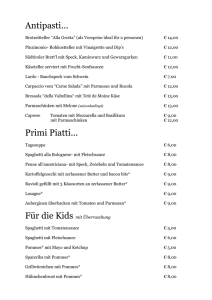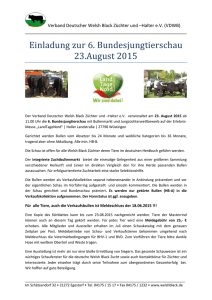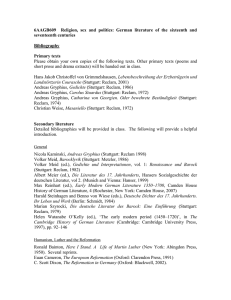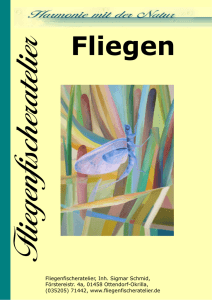Adams, A - Black Diaspora and Germany
Werbung
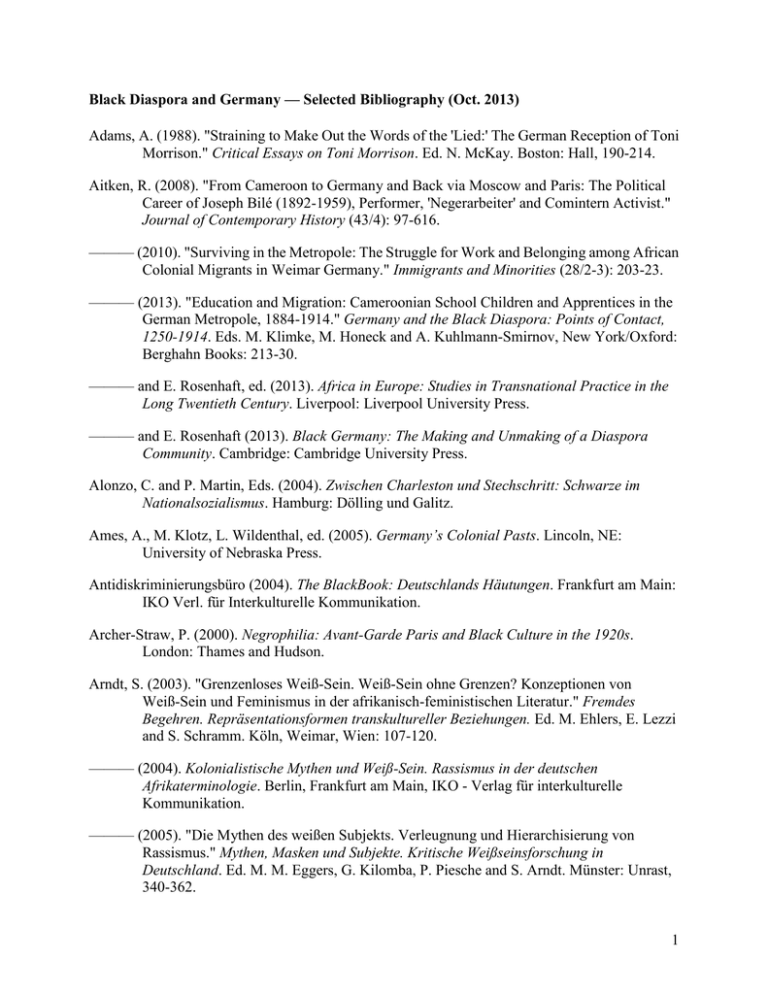
Black Diaspora and Germany — Selected Bibliography (Oct. 2013) Adams, A. (1988). "Straining to Make Out the Words of the 'Lied:' The German Reception of Toni Morrison." Critical Essays on Toni Morrison. Ed. N. McKay. Boston: Hall, 190-214. Aitken, R. (2008). "From Cameroon to Germany and Back via Moscow and Paris: The Political Career of Joseph Bilé (1892-1959), Performer, 'Negerarbeiter' and Comintern Activist." Journal of Contemporary History (43/4): 97-616. ——— (2010). "Surviving in the Metropole: The Struggle for Work and Belonging among African Colonial Migrants in Weimar Germany." Immigrants and Minorities (28/2-3): 203-23. ——— (2013). "Education and Migration: Cameroonian School Children and Apprentices in the German Metropole, 1884-1914." Germany and the Black Diaspora: Points of Contact, 1250-1914. Eds. M. Klimke, M. Honeck and A. Kuhlmann-Smirnov, New York/Oxford: Berghahn Books: 213-30. ——— and E. Rosenhaft, ed. (2013). Africa in Europe: Studies in Transnational Practice in the Long Twentieth Century. Liverpool: Liverpool University Press. ——— and E. Rosenhaft (2013). Black Germany: The Making and Unmaking of a Diaspora Community. Cambridge: Cambridge University Press. Alonzo, C. and P. Martin, Eds. (2004). Zwischen Charleston und Stechschritt: Schwarze im Nationalsozialismus. Hamburg: Dölling und Galitz. Ames, A., M. Klotz, L. Wildenthal, ed. (2005). Germany’s Colonial Pasts. Lincoln, NE: University of Nebraska Press. Antidiskriminierungsbüro (2004). The BlackBook: Deutschlands Häutungen. Frankfurt am Main: IKO Verl. für Interkulturelle Kommunikation. Archer-Straw, P. (2000). Negrophilia: Avant-Garde Paris and Black Culture in the 1920s. London: Thames and Hudson. Arndt, S. (2003). "Grenzenloses Weiß-Sein. Weiß-Sein ohne Grenzen? Konzeptionen von Weiß-Sein und Feminismus in der afrikanisch-feministischen Literatur." Fremdes Begehren. Repräsentationsformen transkultureller Beziehungen. Ed. M. Ehlers, E. Lezzi and S. Schramm. Köln, Weimar, Wien: 107-120. ——— (2004). Kolonialistische Mythen und Weiß-Sein. Rassismus in der deutschen Afrikaterminologie. Berlin, Frankfurt am Main, IKO - Verlag für interkulturelle Kommunikation. ——— (2005). "Die Mythen des weißen Subjekts. Verleugnung und Hierarchisierung von Rassismus." Mythen, Masken und Subjekte. Kritische Weißseinsforschung in Deutschland. Ed. M. M. Eggers, G. Kilomba, P. Piesche and S. Arndt. Münster: Unrast, 340-362. 1 ——— (2005). "Weißsein. Die verkannte Strukturkategorie Europas und Deutschlands." Mythen, Masken und Subjekte. Kritische Weißseinsforschung in Deutschland. Ed. S. Arndt, M. M. Eggers, G. Kilomba and P. Piesche. Münster: Unrast. 24-28. ——— (2006). Africa, Europe and (Post)Colonialism: Racism, Migration and Diaspora in African Literatures. Bayreuth: Breitinger. ——— (2006). AfrikaBilder: Studien zu Rassismus in Deutschland. Münster: Unrast. ——— (2006). "The Racial Turn: Kolonialismus, Weiße Mythen und Critical Whiteness Studies." Koloniale und Postkoloniale Konstruktionen von Afrika und Menschen Afrikanischer Herkunft in der deutschen Alltagskultur. Ed. M. Bechhaus-Gerst and S. Gieseke. Frankfurt a.M.: Peter Lang. ——— (2007). "Transcultural Europe." Narrating Africa in Europe, spec. issue of Matatu: Journal for African Culture and Society. ——— (2007). "Weißsein - Zur Genese eines Konzepts Von der griechischen Antike zum postkolonialen 'racial turn'." Theorie und Praxis der Kulturwissenschaften. Ed. J. Standke and T. Düllo. Bielefeld. ——— (in press). "You are not Born White, You Become White". Conceptions of Whiteness and Africa in German Society and Literature. Ed. R. Cancel and W. Woodhull. Trenton, Asmara: Africa World Press. ———, M. M. Eggers, et al., eds. (2005). Mythen, Masken und Subjekte. Kritische Weißseinsforschung in Deutschland. Münster: Unrast. Axster, F. “Die Angst vor dem ‘Verkaffern’ – Politiken der Reinigung im deutschen Kolonialismus.” WerkstattGeschichte 39 (2005), 39-53. Ayim, M. (1997). Grenzenlos und unverschämt. Berlin: Orlanda Frauenverlag. ———. and A. V. Adams (2003). Blues in Black and White: A Collection of Essays, Poetry and Conversations. Trenton, N.J.: Africa World Press. Bay, M. (2000). The White Image in the Black Mind: African-American Ideas about White People, 1830-1925. New York: Oxford University Press. Bechhaus-Gerst, M., ed. (2006). Koloniale und postkoloniale Konstruktionen von Afrika und Menschen afrikanischer Herkunft in der deutschen Alltagskultur. Frankfurt a.M. et al.: Lang. ——— (2007). Treu bis in den Tod. Von Deutsch-Ostafrika nach Sachsenhausen: Eine Lebensgeschichte. Berlin: Ch.Links. ———, R. Klein-Arendt, eds. (2003). Die (koloniale) Begegnung. AfrikanerInnen in Deutschland 1880–1945, Deutsche in Afrika 1880-1918. Frankfurt a.M. et al.: Lang. 2 ———, R. Klein-Arendt, eds. (2004). AfrikanerInnen in Deutschland und schwarze Deutsche – Geschichte und Gegenwart. Münster: LIT Verlag. Beck, H. H. (1998). "Censoring Your Ally: W. E. B. Du Bois in the German Democratic Republic." Crosscurrents: African Americans, Africa, and Germany in the Modern World. Ed. D. McBride, L. Hopkins and C. A. Blackshire-Belay. Columbia, Camden House: 197-232. Becker, F. (2004). Rassenmischehen, Mischlinge, Rassentrennung: Zur Politik der Rasse im deutschen Kolonialreich. Stuttgart: F. Steiner. ——— and E. Reinhardt-Becker (2006). Mythos USA: "Amerikanisierung" in Deutschland seit 1900. Frankfurt/Main & New York: Campus. Biddiscombe, P. (2001). "Dangerous Liaisons: The Anti-fraternization Movement in the U.S. Occupation Zones of Germany and Austria, 1945-1948." Journal of Social History (34). Blackshire-Belay, C.A. (1996). The African-German Experience: Critical Essays. Westport, Conn.: Praeger. ——— (2001). "The African Diaspora in Europe: African Germans Speak Out." Journal of Black Studies 31 (3): 264-287. Boi, P. and S. Broeck (2003). CrossRoutes - The Meanings of 'Race' for the 21st Century. Münster, LIT Verlag. Brandt, N. (1996). Harlem at War: The Black Experience in WWII. Syracuse, NY: Syracuse University Press. Brändle, R. (2007). Nayo Bruce: Geschichte einer afrikanischen Familie in Europa. Zürich: Chronos. Brauerhoch, A. (2006). "Fräuleins" und GIs. Geschichte und Filmgeschichte. Frankfurt/Main: Stroemfeld. Braziel, J. E. (2007). Diaspora: An Introduction. Malden MA: Blackwell. ——— and A. Mannur (2003). Theorizing Diaspora: A Reader. Malden MA: Blackwell. Breger, C. (2001). "KulturReste im Dreck. Post/koloniale Ausgrabungsfiktionen." Sammeln Ausstellen - Wegwerfen. Ed. G. Ecker, M. Stange and U. Vedder. Königstein/Ts.: Helmer. 155-170. ——— (2004). "Die Rhetorik kultureller Differenz in D. C. v. Lohensteins Afrikanischen Trauerspielen." Zeitschrift für Germanistik N.F. XIV (2): 265-282. ——— (2005). "Imperialist Fantasy and Displaced Memory: Twentieth-Century German Egyptologies." New German Critique 96: 135-169. ——— (2012). An Aesthetics of Narrative Performance: Transnational Theater, Literature and Film in Contemporary Germany. Columbus: Ohio State University Press. 3 Broeck, S. (1988). Der entkolonisierte Körper: Die Protagonistin in der afroamerikanischen weiblichen Erzähltradition der 30er bis 80er Jahre. Frankfurt/Main et al.: Campus. ——— (2006). "Der Neger Jupiter raubt Europa." Literatur Psychoanalyse Gender. B. Ed. W. Emmerich and E. Kammler. Bremen: Edition Lumière. 85-102. ——— (2006). "The Subject of Enlightenment: Notations Towards an Epistemology of Slavery, Gender and Modernity Critical Studies on Gender and Racism." Weiß-Weißsein-Whiteness. Kritische Studien zu Gender und Rassimus. Ed. M. Tissberger et al. Frankfurt: Peter Lang. 105-112. ——— (2011). “Aufklaerung.” Susan Arndt, ed., K/erben des Kolonialismus, Berlin: Unrast. 232-241. Brown, T. S. (2006). "'Keeping it Real' in a Different 'Hood': (African)Americanization and Hip Hop in Germany." The Vinyl Ain't Final: Hip Hop and the Globalization of Black Popular Culture. Ed. D. L. Basu, Sidney J. London & Ann Arbor, MI: Pluto. 137-150. Brubaker, R. (1992). Citizenship and Nationhood in France and Germany. Cambridge MA: Harvard University Press. ——— (2005). "The 'Diaspora' Diaspora." Ethnic and Racial Studies 28 (1): 1-19. Campt, T.M. (1993). "Afro-German Cultural Identity and the Politics of Positionality: Contests and Contexts in the Formation of a German Ethnic Identity." New German Critique (58): 109-126. ——— (2003). "Converging Spectres of an Other Within: Race and Gender in Prewar Afro-German History." Callaloo 26 (2): 322-341. ——— (2003). "Reading the Black German Experience: An Introduction." Callaloo 26 (2): 288-294. ——— (2004). Other Germans: Black Germans and the Politics of Race, Gender, and Memory in the Third Reich. Ann Arbor: University of Michigan Press. Ciarlo, D. M. (2003). Consuming Race, Envisioning Empire: Colonialism and German Mass Culture, 1887-1914. Wisconsin, MA: University of Wisconsin-Madison. ——— (2011). Advertising Empire: Race and Visual Culture in Imperial Germany. Cambridge MA: Harvard University Press. Clifford, J. (1994). "Diasporas." Cultural Anthropology 9.3: 302-338. ——— (1997). Routes. Travel and Translation in the Late Twentieth Century. Cambridge MA, Harvard University Press. Cohen, R. (1997). Global Diasporas: An Introduction. Seattle: University of Washington Press. 4 Debrunner, H.W. (1979). Presence and Prestige. Africans in Europe: A History of Africans in Europe before 1918. Basel: Baseler Bibliographien. Dennis, D. (2011). "Asian and African Workers in the Niches of Society." State and Minorities in Communist East Germany. Eds. M. Dennis and N. LaPorte. New York: Berghahn: 87-123. De Veaux, A. (2004). Warrior Poet: A Biography of Audre Lorde. New York: W.W. Norton. Diedrich, M. (1999). Love across Color Lines: Ottilie Assing and Frederick Douglass. New York: Hill and Wang. ——— (2004). "Afro-amerikanische Literatur." Amerikanische Literaturgeschichte. Ed. H. Zapf et al. Stuttgart: J.B. Metzler. Dietrich, A. (2007). Weiße Weiblichkeiten - Konstruktionen von "Rasse" und Geschlecht im deutschen Kolonialismus. Bielefeld: transcript. Domentat, T. (1995). Coca-Cola, Jazz & AFN: Berlin und die Amerikaner. Berlin: Schwarzkopf & Schwarzkopf. Dorsch, H. (2000). Afrikanische Diaspora und Black Atlantic: Einführung in Geschichte und aktuelle Diskussion. Münster: LIT Verlag. Drake, S. C. (1982). "Diaspora Studies and Pan-Africanism." Global Dimensions of the African Diaspora. Ed. J. E. Harris. Washington DC: Howard University Press. 341-404. Eckert, A. (2003). Review of: Fatima El-Tayeb, Schwarze Deutsche: Der Diskurs um 'Rasse' und nationale Identität 1890-1933 (Frankfurt a.M./New York: Campus, 2001). In: African Affairs 102 (409): 669-670. Edwards, B. H. (2003). The Practice of Diaspora: Literature, Translation, and the Rise of Black Internationalism. Cambridge MA: Harvard University Press. Ege, M. (2007). Schwarz werden: "Afroamerikanophilie" in den 1960er und 1970er Jahren (Cultural Studies 24). Bielefeld: Transcript. Eggers, M.M. (2010). “Knowledges of (Un)belonging: Epistemic Change as a Defining Mode for Black Women’s Activism in Germany.” U. Lindner, M. Möhring, M. Stein & S. Stroh (ed), Hybrid Cultures – Nervous States: Britain and Germany in a (Post)Colonial World, Amsterdam & New York: Rodopi: 189-202. ———, G. Kilomba, et al. (2006). Mythen, Masken und Subjekte. Kritische Weißseinsforschung in Deutschland. Münster: Unrast. El-Tayeb, F. (2001). Schwarze Deutsche: "Rasse" und nationale Identität 1890–1933. Frankfurt am Main: Campus. Fehrenbach, H. (1998). "Rehabilitating Fatherland. Race and German Remasculinization." Signs (24): 107-128. 5 ——— (2005). Race after Hitler: Black Occupation Children in Postwar Germany and America. Princeton N.J.: Princeton University Press. Firla, M. (2010). Der Kameruner Artist Hermann Kessern: Ein schwarzer Crailsheimer. Crailsheim: Baier. Frankenstein, L. (1954). Soldatenkinder: Die unehelichen Kinder ausländischer Soldaten mit besonderer Berèucksichtigung der Mischlinge. München, W. Steinebach on label: München E. Reinhardt. Fremgen, G. (1984). …und wenn du dazu noch schwarz bist: Berichte schwarzer Frauen in der Bundesrepublik. Bremen: CON. Friedrichsmeyer, S., S. Lennox, et al. (1998). The Imperialist Imagination: German Colonialism and its Legacy. Ann Arbor: University of Michigan Press. Gay, P. (1998). My German Question: Growing Up in Nazi Berlin. New Haven and London: Yale University Press. Gelbin, C. S., Kader Konuk, and Peggy Piesche, eds. (1999). AufBrüche: Kulturelle Produktionen von Migrantinnen, Schwarzen und jüdischen Frauen in Deutschland. Königstein, Ts: Helmer. Gerund, K. (2008). “Sisterly (Inter)Actions: Audre Lorde and the Development of Afro-German Women's Communities.” Black Women’s Writing Revisited. Ed. Sabine Broeck. Spec. issue of gender forum 22 (2008). <http://www.genderforum.org/issues/black-womens-writing-revisited/sisterly-interactio ns/>. ——— (2013). Transatlantic Cultural Exchange: African American Women’s Art and Activism in West Germany. Bielefeld: transcript. Gilman, S. L. (1982). On Blackness Without Blacks: Essays on the Image of the Black in Germany. Boston MA: G.K. Hall. Gilroy, P. (1987). There Ain't no Black in the Union Jack: the Cultural Politics of Race and Nation. Repr. London & New York: Routledge 2002. ——— (1993). The Black Atlantic: Modernity and Double Consciousness. Cambridge, Mass., Harvard University Press. ——— (1997). "Diaspora and the Detours of Identity." Identity and Difference. Ed. K. Woodward. London and Thousand Oaks CA: Sage in association with the Open University. 299-343. ——— (2000). Against Race: Imagining Political Culture Beyond the Color Line. Cambridge MA: Belknap Press of Harvard University Press. Gouaffo, A. (2007). Wissens- und Kulturtransfer im kolonialen Kontext: Das Beispiel Kamerun – Deutschland (1884–1919). Würzburg: Königshausen & Neumann. 6 Grimm, R. and J. Hermand (1986). Blacks and German Culture: Essays. Madison, Wis., published for Monatshefte by University of Wisconsin Press. Grosse, P. (2000). Kolonialismus, Eugenik und bürgerliche Gesellschaft in Deutschland, 1850–1918. Frankfurt a.M.: Campus. Gudermann, R. and B. Wulff (2004). Der Sarotti-Mohr: Die bewegte Geschichte einer Werbefigur. Berlin: Links. Hackenesch, S. (2004). "African American Hairstyles Between Political Resistance and Cultural Expression." testcard #13: Black Music (13): 26-31. ——— (2005). "The Wrong Nigga to Fuck Wit! Hip Hop as Contemporary Black Activism?" testcard #14: Discover America (14): 108-113. Hall, S. (1993). "Cultural Identity and Diaspora." Colonial Discourse & Postcolonial Theory: A Reader. Ed. P. Williams and L. Chrisman. New York: Columbia University Press. 392-403. Harris, J. E. (1993). Global Dimensions of the African Diaspora. Washington, D.C.: Howard University Press. Heyden, U. van der, ed. (2008). Unbekannte Biographien. Afrikaner im deutschsprachigen Raum vom 18. Jahrhundert bis zum Ende des Zweiten Weltkrieges. Berlin: Kai Homilius. ———, J. Zeller, eds. (2007). Kolonialismus hierzulande. Eine Spurensuche in Deutschland. Erfurt: Sutton. Hine, D. C. and J. McLeod (1999). Crossing Boundaries: Comparative History of Black People in Diaspora. Bloomington: Indiana University Press. Honeck, M., M. Klimke & A. Kuhlmann, eds. (2013). Germany and the Black Diaspora: Points of Contact, 1250–1914. New York: Berghahn. Höhn, M. (1995). GIs, Veronikas, and Lucky Strikes: German Reactions to the American Military Presence in the Rhineland Palatinate in the 1950s. Pennsylvania. ——— (2001). "Heimat in Turmoil. African-American GIs in 1950s West Germany." The Miracle Years. Cultural History of West Germany, 1949–1968. Ed. H. Schissler. Oxford & Princeton: Princeton University Press. 145-163. ——— (2002). GIs and Fräuleins: The German-American Encounter in 1950s West Germany. Chapel Hill: University of North Carolina Press. ——— (2005). "'Ein Atemzug der Freiheit:' Afro-amerikanische GI's, deutsche Frauen und die Grenzen der Demokratie (1945–1968)." Demokratiewunder: Transatlantische Mittler und die kulturelle Öffnung Westdeutschlands 1945–1970. Ed. A. Bauerkämper. Göttingen: Vandenhoeck und Ruprecht. 7 ——— & M. Klimke (2010). A Breath of Freedom. The Civil Rights Struggle African-American GIs, and Germany. New York: Palgrave Macmillan. hooks, b. (1992). Black Looks: Race and Representation. Boston, MA: South End Press. ——— (1994). Outlaw Culture: Resisting Representations. New York: Routledge. Hopkins, L.T., ed. (1999). Who is German? Historical and Modern Perspectives on Africans in Germany. Harry and Helen Gray Humanities Program Series 5. Washington D C. ——— (2005). "Writing Diasporic Identity: Afro-German Literature since 1985." Not So Plain as Black and White: Afro-German Culture and History, 1890–2000. Ed. P. Mazón and R. Steingröver. University of Rochester Press. 183-208. Hügel-Marshall, I. (2001). Daheim Unterwegs: Ein deutsches Leben. Die Frau in der Gesellschaft. Frankfurt am Main: Fischer. ——— (2001). Invisible Woman: Growing Up Black in Germany. New York: Continuum. Humboldt, C. (2006). Afrikanische Diaspora in Deutschland – eine explorative Studie zur Entstehung und Gegenwart transnationaler afrikanischer Communities in Köln und Umgebung. Berlin: Logos-Verlag. Jobatey, F. (2000). Afro-Look: Die Geschichte einer Zeitschrift von Schwarzen Deutschen. Massachusetts: University of Massachusetts. Junker, C. (2005). "Weißsein in der akademischen Praxis. Überlegungen zu einer kritischen Analysekategorie in den deutschsprachigen Kulturwissenschaften." Mythen, Masken und Subjekte: Kritische Weißseinsforschung in Deutschland. Ed. M. M. Eggers, G. Kilomba, P. Piesche and S. Arndt. Münster: Unrast. Kenna, C. (2007). Die 'DDR-Kinder' von Namibia - Heimkehrer in ein fremdes Land. Göttingen: Hess. Kilomba, Grada (2008). Plantation Memories: Episodes of Everyday Racism. Münster: Unrast. Klein, G. and M. Friedrich (2003). Is this real? Die Kultur des HipHop. Frankfurt am Main: Suhrkamp. Kleinschmidt, J. (1995). "Besatzer und Deutsche. Schwarze GIs nach 1945." Amerika Studien (40): 646-65. Klimke, M. (2006). "Black Panther, die RAF und die Rolle der Black Panther-Solidaritätskomitees." Die RAF und die Reformzeit der Demokratie. Ed. W. Kraushaar. Hamburg: Hamburger Edition. ——— (2010). The Other Alliance: Student Protest in West Germany & the United States in the Global Sixties. Princeton: Princeton University Press. Krause, W. C. (1978). So I Was a Sergeant. Memoirs of an Occupation Soldier. Hicksville. 8 Kusser, A., S. Lewerenz (2007). “Genealogien der Erinnerung – die Ausstellung Bilder verkehren im Kontext der Gedenkjahre 2004/ 2005.” Erinnern verhandeln. Kolonialismus im kollektiven Gedächtnis Afrikas und Europas, ed. S. Hobuß, U. Lölke. Münster: Westfälisches Dampfboot. 214-245. Lemke, S. (2002). "The German Du Bois." German? American? Literature? New Directions in German-American Studies. Ed. W. Fluck and W. Sollors. New York et al.: Peter Lang. 207-215. Lemke-Muniz de Faria, Y.-C. (2002). Zwischen Fürsorge und Ausgrenzung: Afrodeutsche „Besatzungskinder“ im Nachkriegsdeutschland. Berlin: Metropol. Lester, R. K. (1982). Trivialneger: Das Bild des Schwarzen im westdeutschen Illustriertenroman. Stuttgart: Akademischer Verlag Heinz. ——— (1986). "Blacks in Germany and German Blacks: A Little-Known Aspect of Black History." Blacks and German Culture. Ed. R. Grimm and J. Hermand. Madison. 113-134. Lewerenz, S. (2006). Die Deutsche Afrika-Schau (1935-1940). Rassismus, Kolonialrevisionismus und postkoloniale Auseinandersetzungen im nationalsozialistischen Deutschland. Frankfurt a.M. et al.: Lang. ——— (2007). “Völkerschauen und die Konstituierung rassifizierter Körper.” Marginalisierte Körper: Beiträge zur Soziologie und Geschichte des anderen Körpers, ed. T. Junge, I. Schmincke. Münster: Unrast. 135-153. ——— (2008). “‘Basthütten am Kolonial-Mal’: Die ‘Deutsche Afrika-Schau’ (1935-1940).” Kolonialismus hierzulande: Eine Spurensuche in Deutschland, ed. U. van der Heyden, J. Zeller. Erfurt: Sutton. 432-438. ——— (2009). “Wie Thea Leyseck zur ‘Deutsch-Südwest-Afrikanerin’ wurde – Kolonialrevisionismus als vergeschlechtlichter Handlungsraum Schwarzer Menschen im Nationalsozialismus,” Ariadne – Forum für Frauen- und Geschlechtergeschichte (56), Special Issue: Dimensionen des Kolonialismus in Deutschland – eine geschlechtergeschichtliche Perspektive: 32-37. ——— (2011). “‘Loyal Askari’ and ‘black rapist’ – Two Images in the German Discourse on National Identity and their Impact on the Lives of Black People in Germany (1918–1945)“. German Colonialism and National Identity, ed. M. Perraudin, J. Zimmerer. New York & London: Routledge. Lindhout, A. E. (2006). "Hans J. Massaquoi's Destined to Witness as an Autobiographical Act of Identity Formation." Performing Diversity: The Dortmund PGF. Ed. U. Küchler and W. Niehues. Lindner, U., M. Möhring, M. Stein & S. Stroh, eds. (2010). Hybrid Cultures – Nervous States: Britain and Germany in a (Post)Colonial World, Amsterdam & New York: Rodopi. Lorbeer, M. and B. Wild, Eds. (1991). Menschenfresser, Negerküsse. Das Bild vom Fremden im 9 deutschen Alltag. Berlin: Espresso/Elef.Press. Lorde, A. (1980). The Cancer Journals: Special Edition. San Francisco: Aunt Lute. ——— (1982). Zami: A New Spelling of My Name. Berkeley, CA: Crossing Press. ——— (1984). Sister Outsider. Berkeley CA: Crossing Press. ——— (1988). A Burst of Light. London: Sheba Feminist Press. ——— (1997). The Collected Poems of Audre Lorde. New York: Norton. Lotz, R. E. (1997). Black People: Entertainers of African Descent in Europe and Germany. Bonn: Birgit Lotz. Lusane, C. (2002). Hitler's Black Victims: The Historical Experiences of Afro-Germans, European Blacks, Africans, and African-Americans in the Nazi Era. New York: Routledge. Martin, P. (2001). Schwarze Teufel, edle Mohren: Afrikaner in Geschichte und Bewusstsein der Deutschen. Hamburg: Hamburger Edition. ——— and C. Alonso, eds. (2004). Zwischen Charleston und Stechschritt: Schwarze im Nationalsozialismus. Hamburg: Dölling und Galitz. Massaquoi, H. J. (2001). Neger, Neger, Schornsteinfeger: Meine Kindheit in Deutschland. München: Knaur. ——— (2004). Hänschen klein, ging allein… Mein Weg in die Neue Welt. Bern: Scherz. Mazón, P. and R. Steingröver, Eds. (2005). Not So Plain as Black and White: Afro-German Culture and History, 1890–2000. New York: University of Rochester Press. McBride, D., L. Hopkins, et al., Eds. (1998). Crosscurrents: African Americans, Africa, and Germany in the Modern World. Columbia, Camden House. McGuire, P. (1983). Taps for a Jim Crow Army: Letters from Black Soldiers in World War II. Santa Barbara: Univ Press of Kentucky. Mehring, F. (2005). "Deutsch-Amerikanisch-Afrikanische Allianzen: Kulturelle Transferleistungen im Werk von Karl Follen und Ottilie Assing." Vormärz und Exil Vormärz im Exil. Ed. N. O. Eke and F. Wahrenburg. Bielefeld: Aisthesis. 391-428. ——— (2008). "Hans Jürgen Massaquoi." African American National Biography. Ed. J. Henry Louis Gates and E. B. Higginbotham. Oxford & New York: Oxford University Press. ——— (2008). "`Moon of Alabama` / Moon over Harlem: African-American Culture and German American Imaginations from Bertolt Brecht to Edgar G. Ulmer." Edgar G. Ulmer, German-American Film Maker. Ed. B. Herzogenrath. Münster: LIT Verlag. ——— (2008). "Tanzbare Demokratie? Die performative Unabhängigkeitserklärung des 10 Gangsta-Rap als Chance für die globale Jugendkultur des HipHop." Anglo-Amerikanische Popular Music und Ihre Bedeutung für die US-Aussenpolitik und die Internationalen Beziehungen. Ed. W. Kremp. ——— (2009). “’Bigger in Nazi Germany’: Transcultural Confrontations of Richard Wright and Hans Jürgen Massaquoi.” The Black Scholar: Journal of Black Studies and Research 39.1–2: 63–71. ——— (2011). “‘Nazi Jim Crow’: Hans Jürgen Massaquoi’s Democratic Vistas on the Black Atlantic and Afro-Germans in Ebony.” Germans and African Americans: Two Centuries of Exchange. Larry Greene and Anke Ortlepp, eds. Jackson: University of Mississippi Press. 141–165. ——— (2013). “Remediating Multi-Racial Memories: Audre Lorde’s Berlin Years and the Genealogy of Afro-German Life Writing.” American Lives. Ed. Alfred Hornung. Heidelberg: Universitätsverlag Winter. 415–443. Mercer, K. (1994). Welcome to the Jungle: New Positions in Black Cultural Studies. London: Routledge. Michael, T. (forthcoming 2013). Deutsch sein und schwarz dazu: Erinnerungen eines Afro-Deutschen. Munich: DTV. Michels, J. E. (2006). "The Impact of Audre Lorde's Politics and Poetics on Afro-German Women Writers." German Studies Review (29): 21–40. Möhle, H., S. Heyn and S. Lewerenz (2006). Zwischen Völkerschau und Kolonialinstitut. AfrikanerInnen im kolonialen Hamburg. Hamburg: Eine Welt Netzwerk e.V. Nagl, T. (2009). Die unheimliche Maschine: Rasse und Repräsentation im Weimarer Kino. Munich: Edition Text + Kritik. Nederveen Pieterse, J. P. (1998). White on Black: Images of Africa and Blacks in Western Popular Culture. New Haven, CT: Yale University Press. Obermeier, K. (1989). “Afro-German Women: Recording Their Own History.“ New German Critique 46: 172–180. Oguntoye, K. (1997). Eine afro-deutsche Geschichte: Zur Lebenssituation von Afrikanern und Afro-Deutschen in Deutschland von 1884 bis 1950. Berlin: Hoho-Verlag. ———, M. Opitz, and D.Schultz, Ed. (1992). Farbe bekennen: Afro-deutsche Frauen auf den Spuren ihrer Geschichte. Frankfurt am Main: Fischer. Oppel, C. (2008). "(Re)writing 20th Century Slavery: Maillet's L'Étoile Noire." Postcolonial Slavery: Colonialism's Legacy. Eds. Charlotte Baker, Jennifer Jahn, Newcastle: Cambridge Scholars. 86-107. ——— (2008). “W.E.B. Du Bois, Nazi Germany, and the Black Atlantic.” Beyond the Nation. 11 American History in Transnational Perspective. Ed. Uwe Lübken, Thomas Adams, Washington DC: Bulletin of the German Historical Institute No. 5. 99–122. ——— (2009). “(Re)writing 20th Century Slavery: Postmodern Representations of African American Third Reich Experience(s).” From Black to Schwarz: Cultural Crossovers between African America and Germany. Eds. M. I. Diedrich / J. Heinrichs. Münster: LIT Verlag Partridge, D. J. (2008). "We Were Dancing in the Club, Not on the Berlin Wall: Black Bodies, Street Bureaucrats, and Exclusionary Incorporation into the New Europe." Cultural Anthropology 23 (4): 660–687. ——— (2012). Hypersexuality and Headscarves: Race, Sex and Citizenship in the New Germany. Bloomington IN: Indiana University Press. Paul, H. (2001). "Racialized Topographies of the New and the Old World: Jeanette Lander`s Atlanta and Hans J. Massaquoi`s Hamburg." Working Paper. Ed. Berlin, John F. Kennedy-Institut für Nordamerikastudien. No. 127. ——— (2005). Kulturkontakt und Racial Presences. Afro-Amerikaner und die deutsche Amerika-Literatur 1815–1914. Heidelberg: Winter. Pence, K. (1992–93). "The ´Fräuleins´ meet the ´Amis´. Americanization of German Women in the Reconstruction of the West German State." Michigan Feminist Studies 7: 83–108. Piesche, P. (2002). "Black and German? East German Adolescents before 1989 – A Retrospective View of a ‘Non-Existant Issue’ in the GDR." The Cultural After-Life of East Germany: New Transnational Perspectives. Ed. L. Adelson. Washington D.C: AICGS. 37-59. Poiger, U. G. (2000). Jazz, Rock, and Rebels: Cold War Politics and American Culture in a Divided Germany. Berkeley: University of California Press. Poikāne-Daumke, A. (2004). African Diasporas. Afro-German Literature in the Context of the African-American Experience. Berlin: Lit Verlag. Pommerin, R. (1979). Sterilisierung der Reinlandbastarde: Das Schicksal einer farbigen deutschen Minderheit 1918-1937. Düsseldorf: Droste. Raphael-Hernandez, H. (2004). Blackening Europe: The African American Presence. New York: Routledge. Reed-Anderson, Paulette (2000). Rewriting the Footnotes: Berlin und die afrikanische Diaspora – Berlin and the African Diaspora. Berlin: Die Ausländerbeauftragte des Senats. Reiss, M. (2002). Die Schwarzen waren unsere Freunde: Deutsche Kriegsgefangene in der amerikanischen Gesellschaft 1942–1946. Paderborn: Schöningh. Reynolds, Z. N. (2006). Black Victims of the Nazis. London: Black Stock Media. 12 Rüger, A. (1975). “Imperialismus, Sozialreformismus und antikoloniale demokratische Alternative: Zielvorstellungen von Afrikanern in Deutschland im Jahre 1919.” Zeitschrift für Geschichtswissenschaft 23: 1293–1308. Schmelz, A. (2004). Bildungsmigranten aus Afrika und Asien. Frankfurt: Iko-Verlag. Schmitt, A. E. (2005). Hans J. Massaquoi's Autobiographies and Transatlantic Identities. http://www.best.uni-mainz.de/modules/AMS/article.php?storyid=149. Schramm, G. (2011). Wer hat Angst vorm schwarzen Mann: Mein Leben in Deutschland. Berlin: Aufbau Verlag. Schubert, M. (2001). Das Bild des Schwarzafrikaners in der parlamentarischen und publizistischen Kolonialdiskussion in Deutschland von den 1870ern bis in die 1930er Jahre. Stuttgart: Steiner. Smith, W. G. (1948). Last of the Conquerors. New York: Farrar Straus. ——— (1970). Return to Black America. Englewood Cliffs N.J.: Prentice-Hall. Sollors, W. (1997). Neither Black Nor White Yet Both: Thematic Explorations of Interracial Literature. New York: Oxford University Press. Sow, Noah (2008). Deutschland Schwarz Weiß: Der alltägliche Rassismus. München: Bertelsmann. Thode-Arora, H. (2004). "Afrika-Völkerschauen in Deutschland." AfrikanerInnen in Deutschland und schwarze Deutsche: Geschichte und Gegenwart. Ed. M. Bechhaus-Gerst and R. Klein-Arendt. Münster: Lit Verlag. 25–40. Tißberger, M., G. Dietze, et al. (2006). Weiß – Weißsein – Whiteness: Kritische Studien zu Gender und Rassismus. Critical Studies on Gender and Racism. Berlin: Peter Lang. Tölölyan, K. (1996). "Rethinking Diaspora(s): Stateless Power in the Transnational Moment." Diaspora 5 (1): 3–36. Veaux, A. d. (2004). Warrior Poet: A Biography of Audre Lorde. New York: W.W. Norton. Weheliye, A. G. (2006). Afro-Diasporische Identitäten in der deutschen Popmusik. Heinrich Böll Stiftung: Migration – Integration – Diversity. http://www.migration-boell.de/. ——— (2006). Fremd im eigenen Land: People of Color in Deutschland. Heinrich Böll Stiftung: Migration – Integration – Diversity. http://www.migration-boell.de/. ——— (2006). 'Ich will mich nicht ausgrenzen.' Alexander G. Weheliye im Gespräch mit dem HipHop-Pionier Moses Pelham. Heinrich Böll Stiftung: Migration – Integration – Diversity. http://www.migration-boell.de/. ——— (2007). "Mein Volk, das es so noch nicht gibt." re/visionen: Postkoloniale Perspektiven von People of Color auf Rassismus, Kulturpolitik und Widerstand in Deutschland. Ed. K. 13 N. Ha, N. L. al-Samarai and S. Mysorekar. Münster: Unrast. ——— (2008). "My Volk to Come: Specters of Peoplehood in Recent Diaspora Discourse and Afro-German Popular Music." Remapping Black Germany. Ed. T. Nagl and S. Lennox. Durham: Duke University Press. Wimmelbücker, Ludger (2009). Mtoro bin Mwinyi Bakrari (1869–1927): Swahili Lecturer and Author in Germany. Dar es Salaam: Mkuki na Nyota. Wollrad, E. (2001). "Der Weißheit letzter Schluss – Zur Dekonstruktion von 'Weißsein'." Polylog – Zeitschrift für interkulturelles Philosophieren 8: 77–82. ——— (2004). "Körperkartografien - Konstruktionen von "Rasse", Weißsein und Geschlecht." Körper und Identität: Gesellschaft auf den Leib geschrieben. Ed. E. Rohr. Königstein/ Taunus: Helmer. ——— (2005). "Forum Weißsein und Geschlecht – Risiken einer kritischen Forschung zu Weißsein im deutschsprachigen Raum." L'homme 16 (2): 144–150. ——— (2005). "'Fürchte dich nicht, Bleichgesicht.' Weißsein und post/koloniale Blickbeziehungen." Das Somali-Dorf in Oldenburg 1905 – Eine vergessene Kolonialgeschichte? Ed. M. Fansa. Oldenburg: Isensee Florian. 99–104. ——— (2005). Weißsein im Widerspruch. Feministische Perspektiven auf Rassismus, Kultur und Religion. Königstein/Taunus: Ulrike Helmer. ——— (2005). "Weißsein in bundesdeutschen Gender Studies." Mythen, Masken und Subjekte. Kritische Weißseinsforschung in Deutschland. Ed. M. M. Eggers, G. Kilomba, P. Piesche and S. Arndt. Münster: Unrast. 416-426. ——— (2006). "Die Norm ist das Problem. Critical Whiteness Studies und kritische Weißseinsforschung in Deutschland." iz3w (Jan/Feb): 38–41. ——— (2009). "'dass er so weiß nicht ist wie ihr' – Rassismus in westdeutschen Kinder- und Jugendbüchern." Rassismuskritik: Rassismustheorie und -forschung. Ed. C. Melter and P. Mecheril. Schwalbach / Taunus: Wochenschau-Verlag. ——— (2008). "White trash–- das rassifizierte 'Prekariat' im postkolonialen Deutschland." Prekariat. Ed. A. Danila. Bielefeld. Wright, M. M. (2003). "Others-From-Within From Without: Afro-German Subject Formation and the Challenge of a Counter-Discourse." Callaloo 26 (2): 296–305. ——— (2004). Becoming Black: Creating Identity in the African Diaspora. Durham: Duke University Press. Yancy, G., ed. (2004). What White Looks Like. African-American Philosophers on the Whiteness Question. London: Routledge. 14 Zantop, S. (1999). Kolonialphantasien im vorkolonialen Deutschland (1770–1870). Berlin: Schmidt. Zöllner, A. (2005). Schokoladenkind: Meine Familie und andere Wunder. Hamburg: Rowohlt. 15
